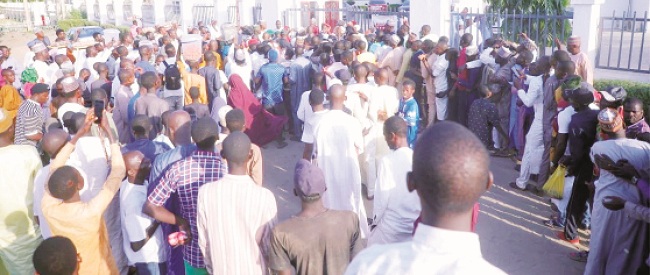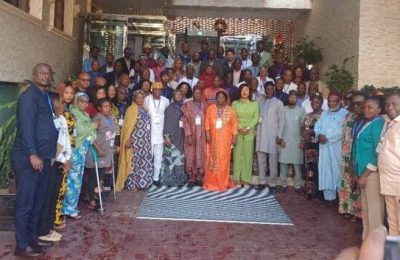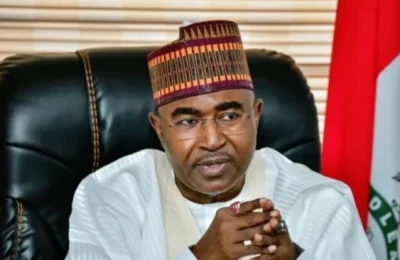
As many Nigerians continue to count monumental losses as a result of the Central Bank of Nigeria’s Naira redesign policy, which Nigerians claim has disrupted lives, business activities and threatened the survival of SMEs, YEJIDE GBENGA-OGUNDARE, in this report, explores the feasibility of legal remedies to compensate for their losses.
For weeks, cash crunch, arising from what has been described as poor implementation of the Central Bank of Nigeria’s Naira redesign policy has been a major issue in Nigeria for the teeming populace; including small and medium scale enterprises that have been facing myraid of operational challenges, both in rural and urban communities across the country.

Nigerians, who hitherto lived and thrived in a cash carrying economy and transacted major day to day business of surviving and greater percentage of economic activities with cash, have been groaning under the heavy burden of getting the almost nonexistent cash for their activities.
For the first time, people had to use naira to buy naira in their country and many couldn’t access their funds that were trapped in banks while many became beggars in a bid to get physical cash to meet major needs as online transactions also continue to fail and small business owners began to reject cashless transactions.
Indeed, the effect of the CBN policy and the chaos caused in the lives of people seem unprecedented; people lost their lives and businesses while wasting countless productive hours on never-ending queues trying to get their money, from the bank, even POS operators couldn’t get money to run their outlets and many closed shops while people who need cash for their livelihoods on a daily basis couldn’t lay their hands on any.
Meanwhile, the informal sector in Nigeria is large and thrives basically on physical cash transactions without which it cannot survive; the seeming underestimation of the cash needs of the majority of Nigerians whose whole existence depends on the informal sector by the Central Bank of Nigeria led to the massive cash crisis which had never been experienced in the country, even during the global meltdown.
And to make matters worse, few POS operators that had cash were selling to Nigerians at extremely high rates, making it impossible for many to access and despite the outcry and efforts of individual state government to find respite for their people, the chaos worsened and degenerated into violence in many states across the country.
There were reports of many losing their lives while on queue at ATM machines, while walking to their places of work due to lack of cash to pay for transportation or at hospitals from ailments that should ordinarily not take their lives; patients have been left untreated in hospitals while family members struggle to get cash for their treatment and some women have had to use unorthodox means to deliver babies after being turned away from hospitals due to cash crunch.
Examples of such losses abound; in many states, there were reports of people collapsing while waiting for money at banks, a woman stripped herself at a bank to press home her demands for money, a pregnant woman in Kaduna state died after her husband failed to get cash in time to pay for her to get medical attention and an On-Air- Personality with a popular radio station in Ibadan, the Oyo State capital lost his life while trekking to the office just because he couldn’t get access to cash for transportation.
But now, there seems to be a ray of light that the situation is gradually coming to an end following a Supreme court judgment in a suit filed by some governors of the ruling All Progressives Congress (APC), mandating the CBN to allow both old and new naira notes to coexist until December 31, 2023.
Though, the situation is not back to normal, there is obvious difference in the stress associated with getting cash as more POS operators are now back in business though many are yet to reduce their exorbitant rates.
With this development, Nigerians heaved a sigh of relief that life will gradually go back to normal but can life be the same again? What happens to lives that were lost and businesses that have folded as a result of the CBN policy that has been described as ill-advised? Is anybody responsible for the losses? And what does the law say.
Nigerian Tribune sought the views of legal practitioners on the feasibility of hapless Nigerians affected by the policy seeking legal redress and compensation and whether the law made provisions for such issues. And lawyers are of the view that there are a legal steps that can be taken in the circumstance.
Speaking on the possibility of Nigerians that suffer loss getting compensation through the instrumentality of the court,
Chief Yomi Alliyu (SAN) stated that “it is unfair and a total disregard to people’s lives and responsibility. There is a contract between a bank and its customer to respect all lawful demands of the customer, the breach of which attracts serious damages.
“Apart from that, there is a principle of law recognised from ages past as *ubi jus ubi remedium* meaning where there is a damage the law must provide a remedy whether or not there is a statutory provision to that effect.
On the above premises banks are liable to pay damages if sued either individually or in class action by their customers as in MICHAEL ALLIYU (For himself and on behalf of other customers of XYZ BANK and CBN.
This becomes more feasible from the date of the Supreme Court judgment.
I encourage young lawyers to try their hands on it to help masses,”he said.
Also speaking, a former chairman of the Nigerian Bar Association, Ikeja branch,
Dave Ajetomobi, said “Yes, when there’s a right and there’s an injury to the right, the law as of necessity must provide a remedy, hence we say ibi just ubi remedium, anyone who suffered any loss in terms of loss of relative or even business as a result of the Emefiele policy can sue the CBN and the Federal Government for redress in form of damages.”
On his part, Barrister Foluso Olapo, said “it is unfortunate that government appears to have waged an economic war against it’s citizens by this monetary policy – cashless/cash swap. Because rather than swapping of cash, what actually took place was cash confiscation which resulted in several deaths, trauma and loss of business.
“Well, citizens can approach the court in a class action to seek redress for the breach of their fundamental human right to life, dignity of the human person and the right to own property as provided for in Chapter Four of the 1999 Constitution (as amended) which the FG and CBN breached with impunity.”
Lending her voice to the matter, the chairman of the Nigerian Bar Association, Folasade Aladeniyi stated that the matter is not a black or white issue.
“As good as your question is, it doesn’t have a straight answer , it depends on the loss each individual suffered. There can be claims in damages and in Tort, medical damages and under degradation of human rights. The people to sue depends on the obligations they have towards them,” she said.
Also speaking, former Oyo State FIDA chairperson, Collins Deborah Oluyemisi Esq stated that “of course people can seek redress in court, but firstly there must be a particular damage suffered to give such a person locus standi to be able to sue. The Central Bank of Nigeria (CBN) Act in my humble opinion having gone through it’s provisions does not explicitly provide the banks with the power to withhold money from customers in Nigeria without due cause or legal basis.
“However, the CBN does have regulatory and supervisory powers over financial institutions operating in Nigeria and it may take measures such as freezing accounts or withholding funds as part of its efforts to maintain financial stability and combat money laundering and other financial crimes. These measures must be carried out in accordance with due process and legal frameworks, and customers have the right to challenge any actions taken against them by the CBN or financial institutions through legal means.
“So as many people there are with grounds of defense and evidences to show cause of action and damages may approach the court for redress,” she added.
According to the lawyers, the law is settled that when there is an injury to people’s right, there must be a remedy in law. However, this can only be effective if Nigerians are willing and ready to go the long haul and fight for their rights.







